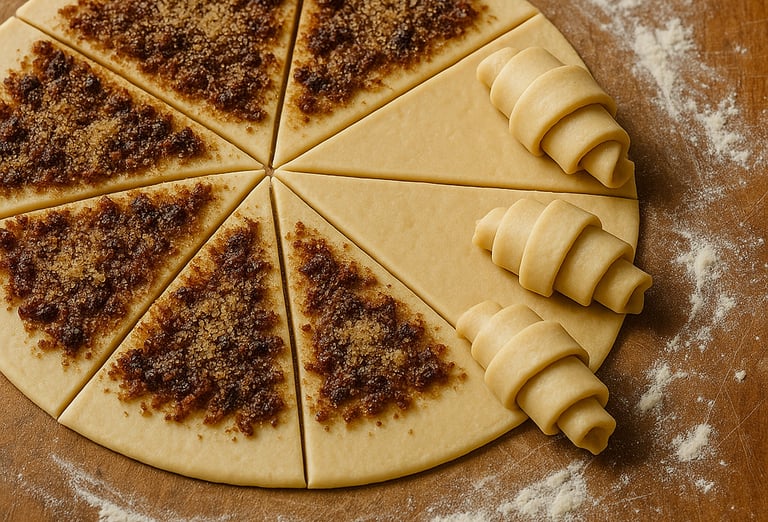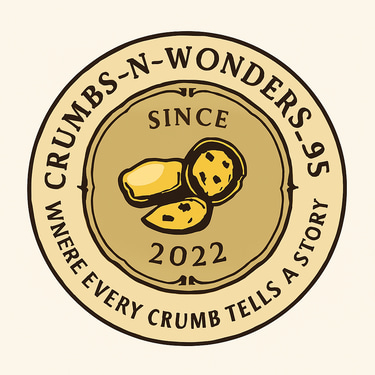Polish Rugelach
Born in Poland’s Jewish communities, rugelach are twisted treats of hope and heritage tiny pastries that carry tradition, resilience, and sweet remembrance across generations.
KITCHEN FLAVORS
Wandering Armenian
7/30/20253 min read


Polish Rugelach: A Sweet Journey Through Time
Introduction
As a former aid worker who has wandered through countless communities worldwide, I've discovered that food transcends borders and tells stories of resilience. Today, I share Polish Rugelach—delicate pastries that carried hope through generations. Their tender cream cheese dough embracing sweet filling mirrors how we find comfort in life's simplest treasures.
Traditional Polish Jewish Rugelach
History of the Cuisine
Rugelach emerged from the vibrant Jewish communities of Poland, where resourceful bakers created these miniature masterpieces from humble ingredients. The name derives from the Yiddish word for "twist," reflecting both the pastry's spiral shape and the winding paths of Jewish diaspora. During times of celebration and hardship alike, these bite-sized delights served as symbols of continuity and hope.
In Polish-Jewish households, rugelach represented more than mere confection—they embodied tradition passed from grandmother to granddaughter, recipes whispered in Yiddish, and the sweet persistence of culture despite adversity. As communities migrated to Israel, America, and beyond, rugelach travelled too, adapting to new kitchens while preserving their essential soul.
These pastries became particularly significant during Jewish holidays like Hanukkah, where their golden-brown exterior echoed the miracle of oil, and their sweet interior celebrated life's enduring joys. In the face of displacement and change, rugelach remained a constant—an edible reminder of home.
Ingredients and Quantities
For the Dough:
2 cups all-purpose flour
1 cup unsalted butter, cut into cubes
1 (8 ounce) package cream cheese, cut into cubes
⅓ cup sour cream
¼ teaspoon salt
For the Filling:
1 cup finely chopped walnuts
½ cup raisins, finely chopped
½ cup white sugar
1 tablespoon ground cinnamon
Additional:
Apricot or raspberry jam for spreading
1 egg, beaten (for egg wash)
Powdered sugar for dusting
Preparation Process
Prepare your workspace: Line a baking sheet with parchment paper and set aside.
Create the dough: In a food processor or large bowl, combine flour and salt. Add cream cheese and butter cubes, pulsing or cutting until the mixture becomes damp and crumbly. Add sour cream and mix until dough forms.
Rest the dough: Divide dough in half, flatten each portion into a disc, wrap in plastic, and refrigerate for at least 1 hour until firm.
Prepare the filling: Combine chopped walnuts, raisins, sugar, and cinnamon in a bowl. Mix well and set aside.
Roll and fill: On a floured surface, roll one dough disc into a rectangle ⅛ to ¼ inch thick. Spread with a thin layer of jam, then sprinkle with half the nut-raisin mixture.
Shape the rugelach: Starting from the long side, tightly roll the dough into a log. Place on prepared baking sheet. Repeat with remaining dough and filling.
Chill again: Refrigerate logs for 30 minutes until firm enough to slice.
Prepare for baking: Preheat oven to 350°F (180°C). Brush logs with beaten egg wash.
Score and bake: Make shallow cuts every inch along the logs (don't cut completely through). Bake for 25-30 minutes until golden brown.
Finish: Cool for 5 minutes, complete the cuts, then cool completely. Dust with powdered sugar before serving.
Nutrition Content (Per Serving - Makes approximately twenty-four pieces)
Calories: 145
Fat: 9g
Saturated Fat: 5g
Carbohydrates: 15g
Fiber: 1g
Sugar: 8g
Protein: 3g
Sodium: 45mg
Note: Nutritional values are approximate and may vary based on specific ingredients used.
Pro Variation Tips
Filling Variations:
Chocolate Rugelach: Replace nuts and raisins with mini chocolate chips and chopped almonds
Savory Version: Use everything seasoning, cream cheese, and chopped herbs
Fruit Forward: Try dried cranberries with orange zest and pistachios
Nutella Dream: Spread Nutella instead of jam and add toasted hazelnuts.
Dough Enhancements:
Add 1 teaspoon vanilla extract for deeper flavor
Substitute half the flour with almond flour for nuttier taste
Include lemon zest for bright, citrusy notes.
Make-Ahead Tips:
Freeze unbaked logs for up to 3 months
Bake from frozen, adding 5-10 extra minutes
Store baked rugelach in airtight containers for up to 1 week.
Professional Techniques:
Keep dough cold throughout process for easier handling
Use a sharp knife dipped in flour for clean cuts
Brush with egg wash twice for extra golden color.
Concluding Thoughts
Like the communities that created them, rugelach teaches us about transformation—simple ingredients becoming something extraordinary through patience and care. In my aid work, I witnessed how food connects hearts across cultures. "Taste and see that the Lord is good" (Psalm 34:8) reminds us that even small sweetness’s reflect divine grace in our journeys. It beautifully ties together the act of sharing food, experiencing God's goodness through simple pleasures, and your journey as someone who has served others across different communities. It reflects both the literal tasting of these sweet pastries and the metaphorical "tasting" of life's blessings through service and connection with others.
Adios Amigo.....till we bake again
With love from the Wayfarer's kitchen

